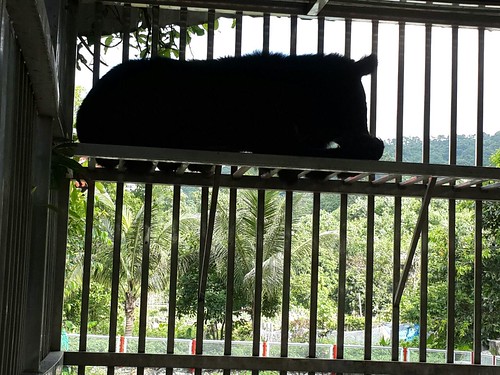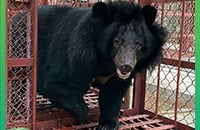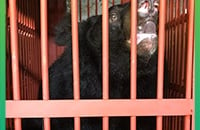Everything you need to know about the last 17 bears in Quang Ninh
08 July 2015
The successful #Halong2Home rescue mission saw 13 bears freed from lives on bear bile farms in Vietnam’s Quang Ninh province, but 17 remain behind - here’s why.
The Prime Minister’s decision
In March this year, the Prime Minister’s office declared that every captive bear in Quang Ninh province must be transferred to Animals Asia’s sanctuary just a few hours drive away. The announcement was the result of Animals Asia’s Save the Halong Bay Bears campaign which drew support from more than 100,000 people around the world.
The first rescues begin
Following recent rescues, #Halong2Home, #SavingSongSot and #BearSeaRescue, 16 bears have been saved from bear bile farming in the region since March.
They are the lucky ones who have seen their transfers confirmed by local authorities.
The Vietnamese government made a take-it-or-leave it offer to these farmers to give up their bears without a fight in exchange for a financial “reward”. Having been told that after this offer expired the bears would be taken regardless, many of the farmers agreed.
However, 17 bears remain on 11 farms in the region as their owners have refused to agree to transfers.
What is causing the delays?
Essentially these remaining 11 farmers are the hard core who refuse to accept that the bear bile farming is over in the province.
It is unclear now what steps the authorities will take. They claimed that their initial reward offer would be their only attempt to persuade the farmers financially.
However, the authorities are equally anxious to avoid confrontation, violence or social unrest.
Essentially, the end of bear bile farming is in uncharted waters.
There is no precedent for this situation and each farmer has their own motivation for wanting to cling to the past. Some have invested in bear bile farming and see no alternative income source should their business fail. Others have become significantly wealthy through exploitation of the bears and are loathe to see the money dry up by allowing their prized “assets” to be taken away. And then there are still others who are keeping bears as a status symbol, a hobby, or as their own personal bile tap. These individuals are personally very wealthy and potentially very well connected both in business and political circles.
What happens next?
We have been told that the local authorities are continuing to negotiate the transfers with the remaining farmers. However, as we are not part of these negotiations, it is impossible for us to know how advanced they are and how the authorities plan to resolve the stand off.
However, the Quang Ninh authorities have been in regular contact with Animals Asia and have made it clear that they have a number of techniques at their disposal to put political pressure on difficult farmers. So far we know that the local government plans to issue a directive to all district chairman in the province, ordering them to use any necessary means to pressure bear farms in their district to close. Such pressure can take many forms but would primarily involve investigations into personal business dealings in search of any irregularities as well as a thorough evaluation of personal and business tax histories. All of which is likely to make wealthy businesspeople very uncomfortable.
What’s the deadline?
The Prime Minister’s announcement in March set a deadline of September for all transfers to be completed and Quang Ninh province to be officially bear bile free. Whatever their next move, local authorities will be anxious to get the bears rescued by the end of July or early August before they have to report back to the Prime Minister in September.
How are the remaining bears?
Without access to the farms – which are on private property – we cannot definitively know the bears’ conditions. However, on four of the farms visited during #Halong2Home, the farmer had hedged their bets and gave up one bear early, while refusing to sanction the transfer of their second bear.
In almost every instance, the bears handed over were significantly weaker than the bears being kept. As mentioned above, the farmers’ motivations and financial situations are varied and so too are the health conditions of the animals in their facilities.
However, these differences are mostly in relation to diet. On every farm, the bears are kept in unsuitable environments, have no free access to water and are given no enrichment, health care or access to outdoor areas.
Every bear is likely to be suffering from serious psychological trauma while Animals Asia’s veterinary team will be prepared for any eventuality when we finally get these long-suffering animals back to the sanctuary they deserve.
Who is favourite to win this stand-off?
The government and the law is entirely on our side in this issue. The declaration from the Prime Minister’s Office was widely reported in the national press and there is no space for manoeuvre in the wording.
Now that the transfer process has begun, it is all but impossible for the Quang Ninh government to fail to see through the transfer of every bear in the province. If any bears were to be left behind, farmers who have already voluntarily transferred their bears would be in a position to sue the authorities. Furthermore, the people and the media – who are fully aware of the situation – would see clear corruption in any deal that would allow a select few farmers to keep their bears. For even a single bear to be left behind would put the Quang Ninh government in an impossible position.
The remaining farmers are merely delaying the inevitable. Every bear in the province will be transferred to our sanctuary. Our responsibility is to make sure we’re ready to rescue these bears at a moments notice, as we have always been.
BACK








 Freedom after two decades: Moon bears Nang and Mua rescued
Freedom after two decades: Moon bears Nang and Mua rescued
 With heavy hearts we say goodbye to our beloved Tulip
With heavy hearts we say goodbye to our beloved Tulip
 Three moon bears rescued from notorious bear bile farming hotspots in Vietnam
Three moon bears rescued from notorious bear bile farming hotspots in Vietnam